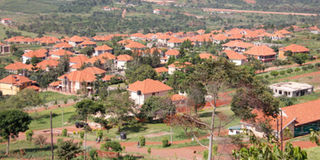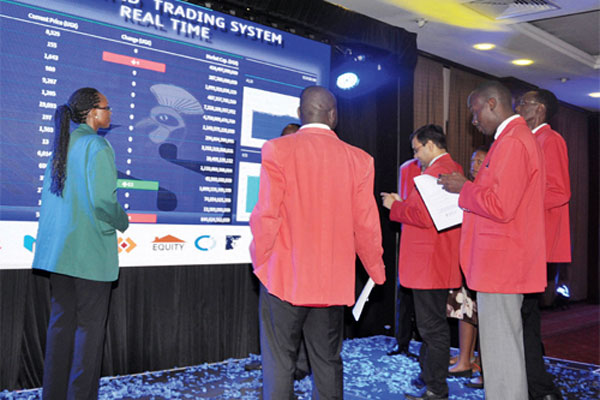NSSF struggles to find Uganda Clays investor

Competition and cheap substitute imports have been a key factor that have made it impossible for Uganda Clays to capture enough market for its wide range of products. FILE PHOTO
Kampala- In mid-2016, National Social Security Fund (NSSF) put a part of its shares in Uganda Clays Limited on sale.
This was an attempt to cut back on losses linked to the struggling building materials manufacturer.
However, the partial sale has failed to materialise for nearly two years due to scarcity of buyers and concerns over the company’s growth outlook.
National Social Security Fund holds majority shareholding in Uganda Clays, part of which was gained after the Fund turned part of its debt into equity.
Uganda Clays has watched its share price drop from an average of Shs75 ($0.019) in 2011 to less than Shs35 ($0.009) today and is yet to clear a loan of Shs11.5b ($3m) obtained from NSSF seven years ago.
NSSF sought to convert the outstanding loan and accumulated interest into shares that would in turn, increase its shareholding in Uganda Clays from 32 per cent to 50 per cent.
Following the debt-to-equity conversion, NSSF would have proceeded to sell part of its expanded stake in the company to a new investor, thereby leaving it with a minority shareholding of about 20 per cent.
Though NSSF had set a deadline for conclusion of the transaction at the close of 2016/17, it was not realised. Neither was the 2017/18 after closure of the financial year for the period ended June 30.
Lingering growth fundamentals have reportedly scared off potential buyers and they continue to watch events at the Kajansi-based building materials manufacturer from a distance.
Whereas Uganda Clays’ continues to be a major manufacturer such as building materials, which comprise of roofing tiles, carved blocks, bricks and maxpans - a clay brick used for laying floors in multi-storeyed buildings - fierce competition from cheaper product substitutes such as iron sheets and cement bricks raise fears about the company’s future.
The substitutes have shorter delivery periods compared with clay products, are easier to install at construction sites and also cost less to transport.
These are all critical competitive factors that have made them more popular in the construction industry.
Questions over the distribution model of Uganda Clays’ products upcountry have also dampened investor appetite.
Al though the company maintains large outlets in some major towns and a limited network of smaller “next door” hardware agents, some customers worry over high transport costs they have to incur.
Beyond this, is the modest real-estate sector growth between 2016 and 2018, which is partly blamed for the poor investor interest in the NSSF offer.
The real sector grew by 6.4 per cent in 2017/18 compared higher than the 5.6 per cent registered in 2016/17.
This trend was driven by improved credit flows to the real estate and construction industry but the longer-term outlook remains unclear.
NSSF insists they have been contacted by some interested investors.
Financial results published last month indicate that Uganda Clays turnover increased from Shs12.86b ($3.39m) in June 2017 to Shs14.45b ($3.81m) for the year ended June 30, 2018.
However, sales costs rose from Ush6.55 billion ($1.73 million) to Ush8.62 billion ($2.27 million).
Profit after tax fell from Shsh2.17b ($571,660) in June 2017 to Shs1.27b ($334,874) in June 2018.
Total assets grew from Shs15.63b ($4.12m) in June 2017 to Shs18.06b ($4.76m) in June 2018.
Whereas Uganda Clays share price hit a record high of Shs33 ($0.009) in the final quarter of 2017, it has since dropped to between Shs20 ($0.005) and Shs23 ($0.006) over the past two months.
This does not auger well with investor confidence at a time when the company is looking for a buyer.
“Uganda Clays is a fairly complex business that holds a virtual monopoly but operates in a fragmented market. This is why we need a sophisticated investor that is able to combine money and expertise to transform the business. We have been contacted by a few buyers, whose identity will remain confidential,” Mr Richard Byarugaba, NSSF managing director, says.
Mr Byarugaba is also cognizant of the effect of fierce competition from imported product substitutes on Uganda Clays performance but maintains that “the products still hold a niche market that appeals to customers who prefer the long-lasting tiles”.
Losses from share price
Last month, according to details from the Uganda Securities Exchange, Uganda Clays lost a market value by Shs8.1b after the company’s share price fell from Shs29 to Shs20 in only three months.
The share price, according to market statistics from Uganda Securities Exchange had been falling consistently since April throughout June.
Uganda Clays, which listed 900m ordinary shares in 2000 has had a turn of bad luck over the years, failing to make a profit. However, the company has in the last two years returned to probability.
In 2017, Uganda Clays registered a profit after tax of Shs2.39b and grew its revenues by 4.5 per cent to Shs27.2b up from Shs26b in 2016.
However, according to Ms Barbara Akello, a stock broker at African Alliance, while the share price has dropped in the past three months, its should not cause for alarm as the sales are a matter of demand and supply.
Uganda Clays has since 2007 grappled with huge loans, key among them the Shs10.5b debt to NSSF that has weighed down the company.
At an annual general meeting held on July 4, Uganda Clays said it was searching for an investor to help it increase production capacity and profitability. The company has also widened its distribution network and segmented the company into territories with key partners in new sales, creating 13 outlets across the country.
[email protected]




